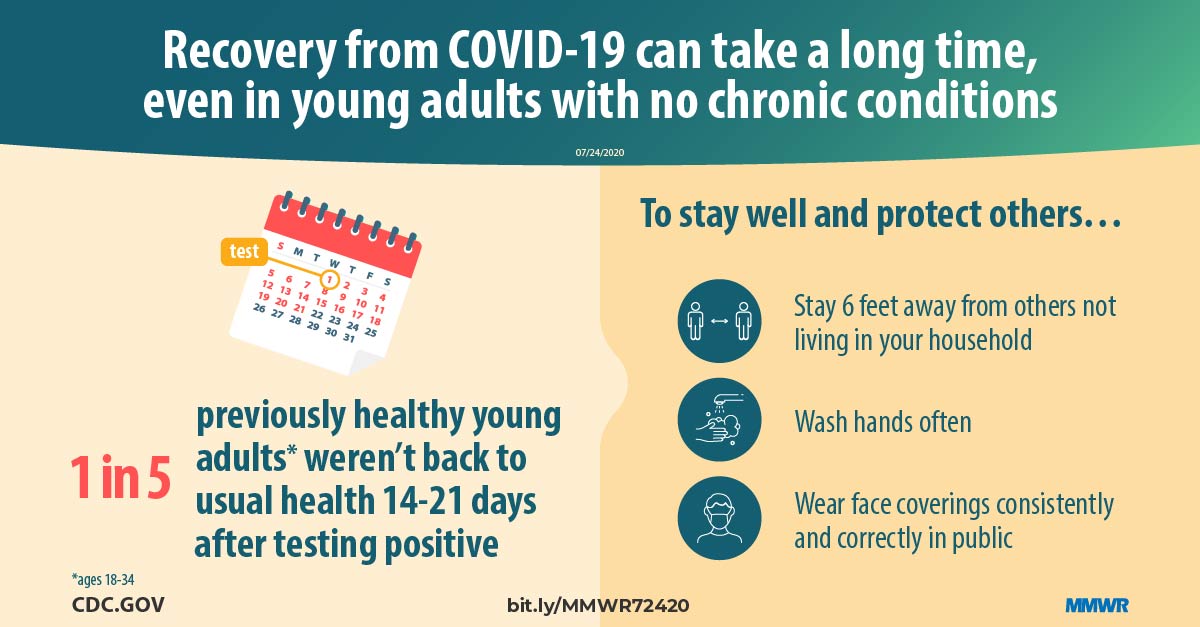You are here
CDC survey indicates even younger Covid-19 victims have prolonged problems.
Primary tabs
Sat, 2020-07-25 05:03 — mike kraft
 Covid-19 can be a prolonged illness, even for young adults, CDC report says Covid-19 can be a prolonged illness, even among young adults without underlying chronic medical conditions, the US Centers for Disease Control and Prevention reported Friday. Thirty-five percent of those surveyed by the agency said they still weren't back to their usual good health even two to three weeks after testing positive for the disease. CNN
Covid-19 can be a prolonged illness, even for young adults, CDC report says Covid-19 can be a prolonged illness, even among young adults without underlying chronic medical conditions, the US Centers for Disease Control and Prevention reported Friday. Thirty-five percent of those surveyed by the agency said they still weren't back to their usual good health even two to three weeks after testing positive for the disease. CNN
 Symptom Duration and Risk Factors for Delayed Return to Usual... Prolonged symptom duration and disability are common in adults hospitalized with severe coronavirus disease 2019 (COVID-19). Characterizing return to baseline health among outpatients with milder... Centers for Disease Control and Prevention
Symptom Duration and Risk Factors for Delayed Return to Usual... Prolonged symptom duration and disability are common in adults hospitalized with severe coronavirus disease 2019 (COVID-19). Characterizing return to baseline health among outpatients with milder... Centers for Disease Control and Prevention
 Covid-19 can be a prolonged illness, even for young adults, CDC report says Covid-19 can be a prolonged illness, even among young adults without underlying chronic medical conditions, the US Centers for Disease Control and Prevention reported Friday. Thirty-five percent of those surveyed by the agency said they still weren't back to their usual good health even two to three weeks after testing positive for the disease. CNN
Covid-19 can be a prolonged illness, even for young adults, CDC report says Covid-19 can be a prolonged illness, even among young adults without underlying chronic medical conditions, the US Centers for Disease Control and Prevention reported Friday. Thirty-five percent of those surveyed by the agency said they still weren't back to their usual good health even two to three weeks after testing positive for the disease. CNN  Symptom Duration and Risk Factors for Delayed Return to Usual... Prolonged symptom duration and disability are common in adults hospitalized with severe coronavirus disease 2019 (COVID-19). Characterizing return to baseline health among outpatients with milder... Centers for Disease Control and Prevention
Symptom Duration and Risk Factors for Delayed Return to Usual... Prolonged symptom duration and disability are common in adults hospitalized with severe coronavirus disease 2019 (COVID-19). Characterizing return to baseline health among outpatients with milder... Centers for Disease Control and Prevention CNN)Covid-19 can be a prolonged illness, even among young adults without underlying chronic medical conditions, the US Centers for Disease Control and Prevention reported Friday. Thirty-five percent of those surveyed by the agency said they still weren't back to their usual good health even two to three weeks after testing positive for the disease.
The CDC had survey results from 292 people who had a positive test for Covid-19 and were treated as an outpatient from April 15 until June 25. The interviews were done 14 to 21 days after people were originally tested. The results were reported in the CDC's Morbidity and Mortality Weekly Report on Friday.
Of those surveyed, 94% said they had at least one symptom when they went in for a Covid-19 test. People reported having a median number of seven of the 17 symptoms listed by the CDC. Fatigue was the most common complaint, followed by cough and a headache.
For the people whose symptoms lingered, 43% said they had a cough, 35% said they felt tired, and 29% said they were short of breath. The median time that they had been interviewed was 16 days from when they tested positive.
Age seemed to play a role in whether someone still felt sick weeks after a positive test. More of the people in the 50-and-older demographic, 47%, said they still had symptoms weeks after their test. By comparison, among people ages 18 to 34, 26% said they still had symptoms. For people in the 35-to-49 age range, 32% said they still weren't back to full health.
Country / Region Tags:
Problem, Solution, SitRep, or ?:
Groups this Group Post belongs to:
- Private group -



Recent Comments